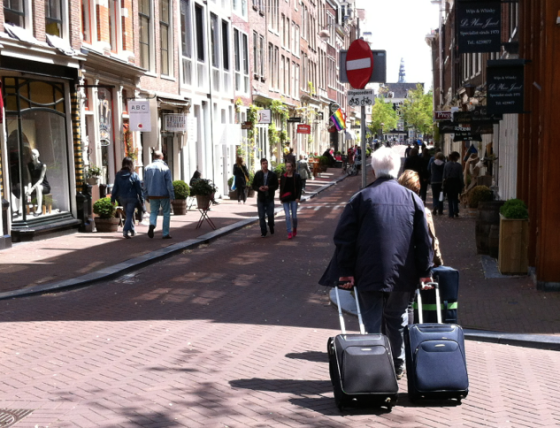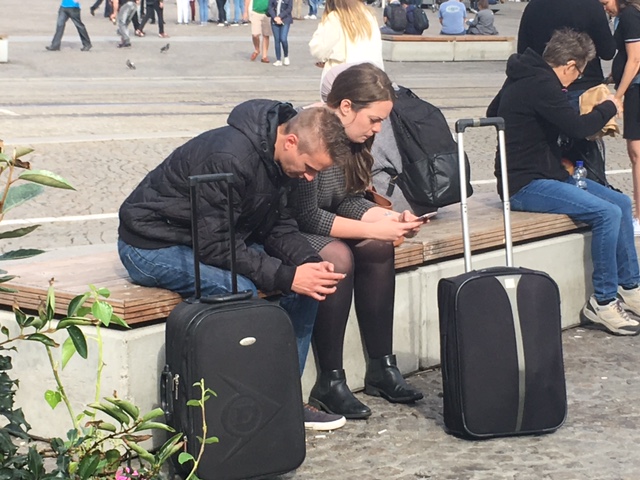Airbnb faces 30,000 complaints from Dutch residents over consumer service charges

Photo: DutchNews.nl
When Marjolein van der Harst takes a break from managing renovations for an all-female painters company, she enjoys visiting Ibiza, Budapest, Portugal and the Netherlands through apartments listed on Airbnb.
“I love vacationing with Airbnb because I don’t like big hotels and normally it’s a bit more private,” she said. “I enjoyed my vacation… but if I paid too much for it, I would like my money back.”
Van der Harst is one of around 30,000 Dutch residents who have joined three sets of claims against the vacation rental giant, after a Dutch court ruled in March that it broke Dutch law by charging a fee to apartment owners and holidaymakers.
For her, it’s about €200 she’s paid in service fees to Airbnb to rent apartments over the past three years, and she’s registered her claim through the online legal claims startup . Call.
“If Airbnb works in Holland and we have certain laws, then it has to work with them,” she says. “If I go on vacation to another country, I have to live by their laws and if I don’t, there is a punishment for that. I can’t say: ‘I’m Dutch: we have different laws!’
‘Unfair’
Her claim is submitted by Appeal, an online system to help tenants recover fees allegedly illegally charged for a housing transaction, and it is one of 12,453 Appeal claims with a total value of 1, 9 million euros against Airbnb… and it goes on.
Frank Oostrum, a lawyer and co-founder of the start-up, said it was launched in 2019 originally to serve normal tenants who cannot be billed fresh to move into a house since a 2015 Supreme Court ruling. ‘After the Airbnb case in March, we received a lot of questions from our customers. We already knew a lot about agency fees and unfair rental fees, so we thought we’d take Airbnb complaints too – and it went totally viral.
The challenges all started in March of this year, thanks to TweeHeren BV, which began challenging Airbnb tenant fees. In the March ruling in Amsterdam, it was revealed that Airbnb was asking apartment owners to pay 3.6% of the booking value, while charging tenants an average of 15% of the total.
Although Airbnb argued it was governed by Irish law, the Dutch court found that local consumer law still applied, the website ‘served two masters’ and had to reimburse plaintiff Jacques Huppes €470 .
Intermediate
Thomas Wildenbeest, contract lawyer at FlexIEbel and representing Twee Heren, told DutchNews.nl that this is a test case and that a collective claim for around 10,000 other claimants is being prepared for a value of around 2 million euros. “If you are acting as an intermediary between two parties and one of them is a consumer, you are not allowed to ask the tenant for money,” he said.
“This is a rule of Dutch law that applies to real estate agents, but also to large technology companies such as Airbnb that operate in the Dutch market. It is simply against the law and relatively simple to solve by only charging money to the people who rent the property.
He said that while the March case does not set a legal precedent, the other cases are so similar in substance that he thinks Dutch judges would logically rule in the same way. He added that consumer law in other countries – such as China – might have similar bans, but that would have to be tested there.
“Other than that, it’s a nice platform and what they’re doing is awesome,” he added. “But if someone gets too big, at some point it seems like they think local legislation is no longer necessary.”
Huppes confirmed to DutchNews.nl that Airbnb has reimbursed its costs and that Twee Heren has started working on 165 new legal cases.
No cure, no costs
Claims – which are generally handled on a “no-handle, no-cost” basis and would take around 25% to 30% in fees if the claim is won – are also initiated by other lawyers.
Rental lawyer Martijn van Hurne of Onyx Advocaten is representing three plaintiffs who may choose to join a larger claim to go to court if Airbnb and others fail to reimburse the service fee. He told the NRC that other holiday home companies such as Belvilla, HomeAway and (until recently) Natuurhuisje.nl charged similar fees. “It’s a matter of principle,” he told DutchNews.nl. “Airbnb did something that is not allowed and lined their pockets.”
Other cases are amassed by the consumer rights organization, the Consumption obligationwho said to LIT it processes 9,700 cases with an average value of €185 per person.
Airbnb told DutchNews.nl in a statement that it would vigorously contest the new claims: “The decision of the District Court of Amsterdam does not create a precedent and the courts of Utrecht and Rotterdam have rejected similar claims”, did he declare.
“In addition, this decision is contrary to the decision of the highest European judge who recently decided that Airbnb is not a real estate agency but an information service. We play by the rules and take the rights of our users very seriously.’
Some Dutch consumers wonder if another option might be to book their holidays by other means in the future. “If Airbnb doesn’t like the law or doesn’t want to be ruled by it,” says Van der Harst, “maybe they can’t work here in Holland anymore.”


Comments are closed.